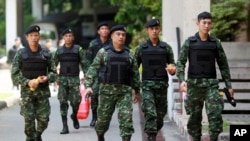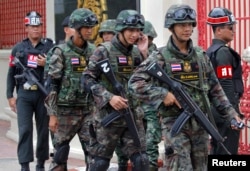Thailand has broadened the powers of the military to include policing crime. The enhanced powers come as the government launches a campaign against local organized crime networks and criminal elements throughout the country.
But human rights activists have expressed concerns of potential abuse under the law.
The new orders, issued this week, allow military personnel acting as crime suppression officers to conduct searches, seize assets, suspend financial transactions and prevent suspects from travelling abroad.
More than 20 criminal activities are covered by the order, including human trafficking, fraud, defamation, gambling, immigration, prostitution, customs, loan sharking and firearm offenses.
Deputy Prime Minister Prawit Wongsuwan defended the special powers, saying the government needs the military personnel to compensate for shortages in the police force.
Government sources who spoke to VOA on condition of anonymity said influential people were often warned by local police before investigating officers could make an arrest. They pointed to links between local influential and criminal figures, local police and national politicians.
Prawit said a government list of influential people targeted in the crackdown includes “hundreds of police and military officers.” Panitan Wattanayagorn, an adviser to the deputy prime minister, said the minister has called for caution in the implementation of the orders.
“This is a special power for the military to use against those Mafia [organized crime] bosses. They aim to assist or implement those powers to this list of people the police may not be able to handle effectively,” Panitan said, citing comments by Prawit.
“And he [Prawit] said the military should use its power cautiously. He will monitor implementation of this power closely to make sure they do not abuse the power,” he told VOA.
But rights groups and law associations quickly raised concerns about the new order saying the offenses specified in the law could be used to target government critics.
Sunai Pasuk, Thailand representative for the New York-based rights group Human Rights Watch, said the order was seen as a form of martial law, potentially open to abuse.
“The latest power that the military granted to its soldiers in the name of the war on Mafia is, in fact, you know, a martial law in disguise. It provides unchecked, unaccountable powers to the soldiers to carry out police duty without any oversight and they will not be held accountable for any misconduct or human rights violations that may ensue,” Sunai said.
Under Thailand’s interim constitution, in place since the military came to power in 2014, orders issued under section 44 of the charter, which addresses issues of national security, are outside judicial review. Rights groups say this raises concern of abuse.
Gotham Arreya, a lecturer and advocate at Mahidol University, says the absence of judicial oversight is a concern. “It seems that the point that I’m worried about is that they can search any place without the court’s permission. I’m not so sure according to this order the power of the officers, the military officers could be checked by the judiciary or not. So my concern is that it gives a lot of power to these officers,” Gotham said.
The new powers come as the military government is also reported to have adopted a tougher stance against politicians critical of the 2014 post-coup government and who refuse to cooperate.
The government has applied so called “attitude adjustment” brief detention sessions on dozens of critics, politicians, activists and academics. There has also been close monitoring of political seminars, lectures and events undertaken by the Foreign Correspondents Club of Thailand.
The stepped-up security measures come as the Constitution Drafting Committee this week completed a new draft charter due to go to a referendum on August 7.
If the charter is passed in the national vote, this would lead the way to planned general elections in 2017.








